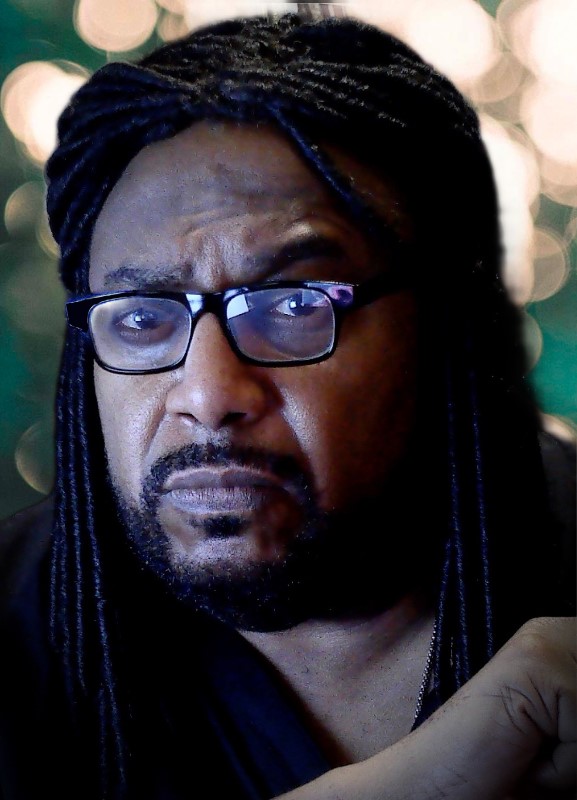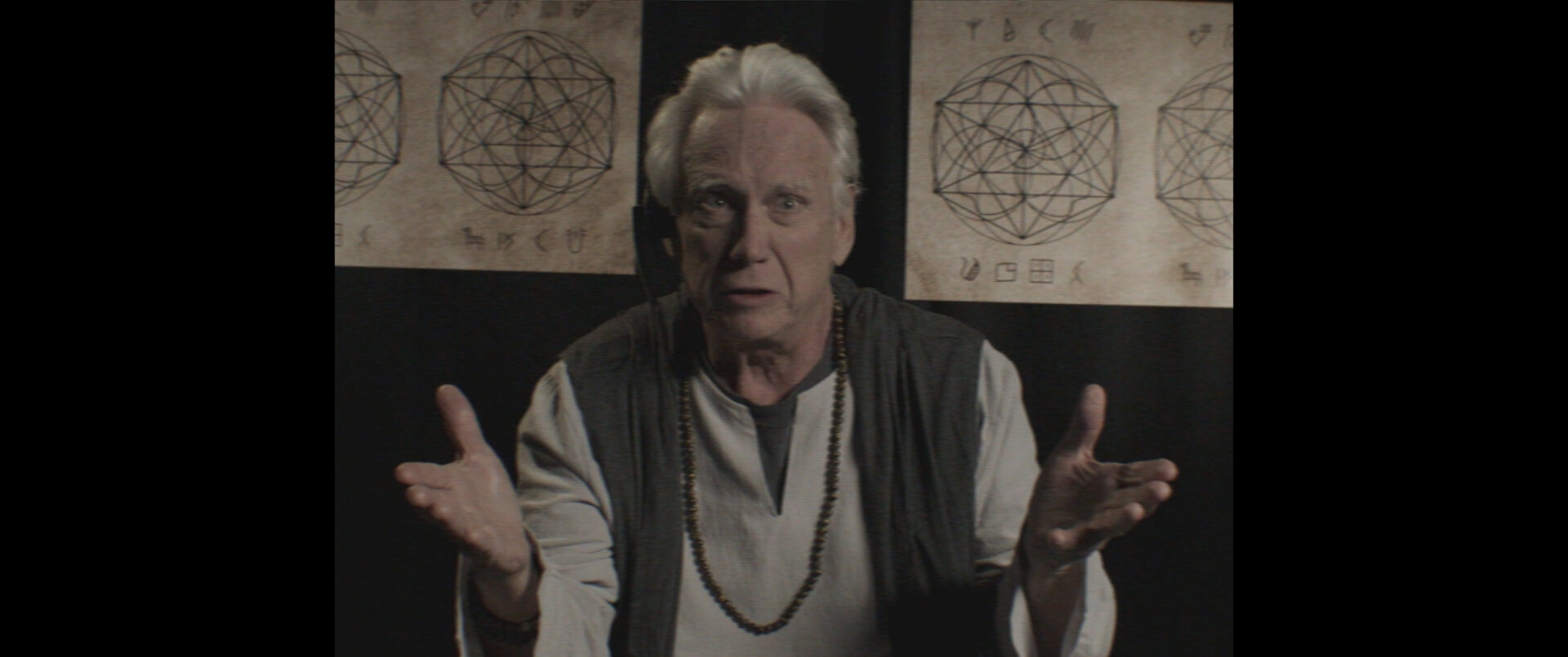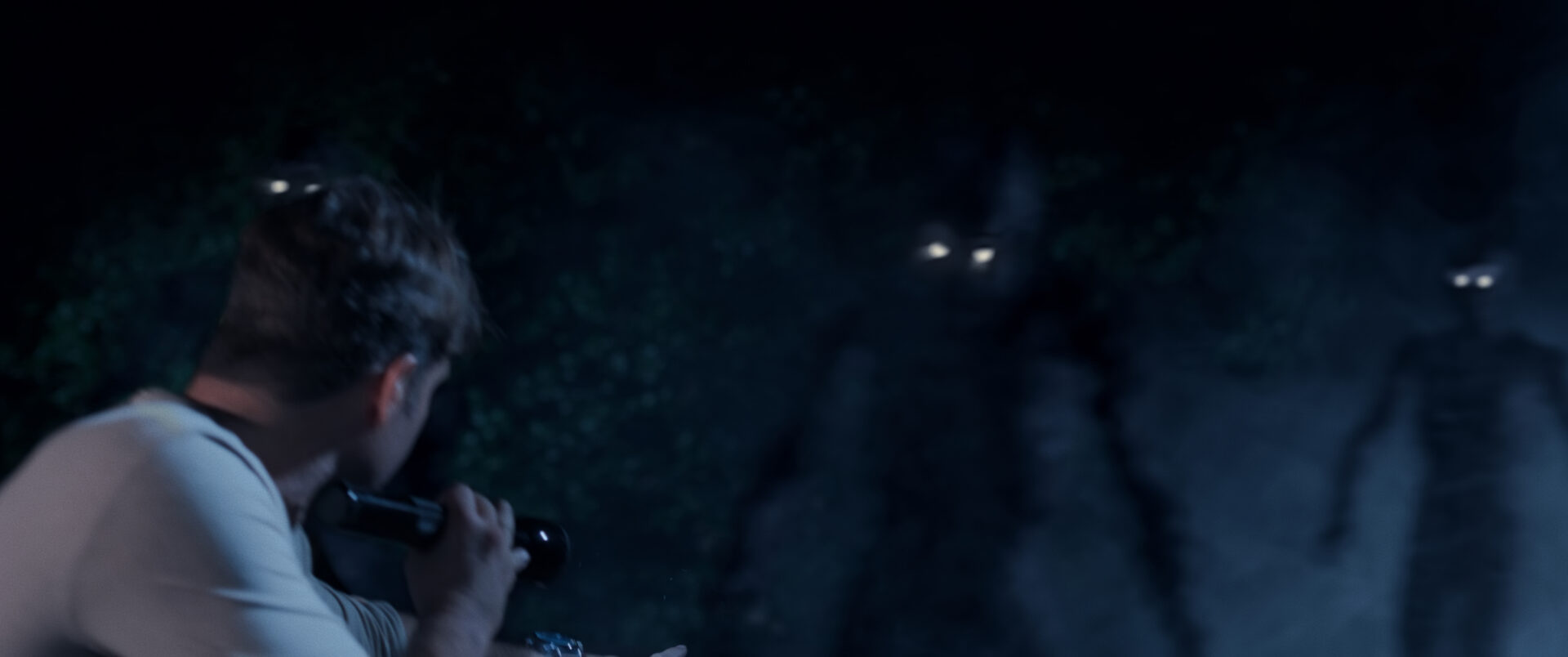
Mike Sargent is a cinematic polymath: he has worked behind the camera as a Producer, Screenwriter, Director, Composer, Sound Designer & Storyboard artist. His knowledge of motion pictures is further attested by his work as film critic, as the host of several television and radios show, spanning from Arise Networks to WBAI Radio.
As an artisan of the filmic craft, Mike Sargent was awarded the prestigious Audelco Award for excellence in Sound Design and has illustrated storyboards for Brain Damage by Frank Henenlotter, Illegal Tender & The Ministers by Franc Reyes, and most recently two projects for John Leguizamo.
His short film, The Lesson, premiered to critical acclaim at the Visions of New Black filmmaker’s Festival and his feature debut Personals was the opening night film at the Los Angeles’ Pan African Film Festival in 1999. His upcoming documentary Bad Boys, explores how the iconic image of the philanderer is often desired by women.
Mike Sargent’s new feature film — From The Shadows — intertwines the horror genre, with science fiction and expands on the perceptual power of the mind. He returns behind the camera with a top-notch cast that includes industry legends Keith David (John Carpenter’s The Thing, Nope, Requiem for a Dream) and Bruce Davidson (Ozark, 1923, Willard, X-Men), as well as Selena Anduze (Agent Rodriguez in Marvel’s Disney+ series WandaVision). The crew is just as supreme with music composer Alan Howarth (Halloween 2-6, Escape from New York), Academy Award winning sound designer Cecelia Hall (Top Gun, The Hunt for Red October, The Addams Family, Star Trek I-III) and special make-up effects guru Vincent Guastini (Requiem for a Dream, Dogma, The Taking of Deborah Logan).
From The Shadows — written by Ian Holt, Michael Kuciak, and director Mike Sargent — explores a supernatural cult and its survivors, and the ancient terror that lies at the heart of its conspiracy. The story shows how the infamous Hidden Wisdom cult, lead by Dr. Joseph Cawl (Bruce Davison), is put under scrutiny ever since Dr. Leonard Bertram (Keith David) went missing and when eighteen of his followers died in a mysterious inferno.
Five young survivors who survived the tragedy are suspected of igniting the blaze: Henry (Ian Whitt), Tina (Claire Mack), Denise (Ester Tania), Keith (Max MacKenzie), Zoe (Briana Femia). They contact on a video-call, paranormal researcher Amara Rowan (Selena Anduze), who with the help of her videographer Peter (Jim Thalman), records their conversation that will turn out to have an unexpected twist.

In this Exclusive Interview, Mike Sargent takes us through his creative process in the making of his latest cinematic oeuvre:
Your previous experience as director ranges from comedy (Personals) to documentary (Bad Boys), how was it to tackle the horror genre for From The Shadows?
The challenge with horror, I guess, is similar to the challenge with comedy, where you have setup and payoff. If the setup is good enough, then the payoff can work. And in regard to making something scary, I learned a lot by studying other horror films that I liked, what made them work. And I didn’t see this as strictly horror.
Are there some paranormal films that have been inspiring for the choice of style?
I would say that for that making of From The Shadows, the film I most was inspired by Sam Raimi’s Drag Me To Hell. What I liked about it is that it’s actually a thoughtful, sometimes almost philosophical film, but then it goes crazy with gore or scariness. I didn’t want to go quite that far. I think there are two types of horror there’s the supernatural horror where something is inherently evil and it’s demonic, and then there’s the psychological horror where it’s some human being doing evil things for whatever reason. There’s definitely been blends in the genre of those two where someone is driven crazy by a supernatural force or something like that. But what interested me more is the idea that, like in The Shining, the person doesn’t realise what’s happening to them, but people around them are being affected.
Some of the dark figures in your film are the Shadow People, that are present in a variety of cultures. Your depiction and description of them as “soul eaters” reminded me of the Harry Potter characters, did J.K. Rowling influence you somehow?
The Shadow People is one of the most fascinating aspects of the script for me. And no, it wasn’t inspired in any way by J. K. Rowling, but I think J. K. Rowling was probably inspired for the same reason that I, Mike Kuciak and Ian Holt were. When Mike Kuciak first introduced The Shadow People into one of the drafts of the script as we were working, it was actually one character backstory that he had put in the script that intrigued me. And when I did more research, I learned that… Shadow people pop up in many different cultures and every explanation for them is scarier than the next.
The more research that we did, the more it began to take over and it made even more sense. Almost everything you hear in the film, all the statistics, the facts, the myths, the legends are all completely true. And that’s something else I love in a film where you hear something or you learn something and if you actually went and researched it, you’d go, ‘Oh my goodness, that’s real!’ That was a very important part of the film for me.
There are many references to neuroscience and to historical beliefs on the power of perception, what was your research to bring this story to life?
All those historical beliefs on the power of perception and how untapped our human abilities are, have always fascinated me. Like extrasensory perception or psychic phenomena. I completely believe that people do have abilities. And I also believe that people often have abilities that they maybe wish they didn’t have. So those elements were things that worked their way into the story. A lot of them were already there from Mike Kuciak’s script, but those were the things that for me are the most interesting, I like the idea of a thoughtful horror film, a horror film that makes you think.
How did you cast your actors and prepare them for their roles?
Well, working with legends like Bruce Davis and Keith David, we rehearsed, but our rehearsal was a lot more about talking about the characters, their motivation, their history and why they’re at odds with each other. We worked on how close they once were. What’s going on is a betrayal of their friendship and their shared love of knowledge and the pursuit of knowledge. So, once they understood just who these men were, they’re such veterans and masterful craftsmen that just watching them perform was like watching two rock stars perform.
With the kids I think I completely lucked out on, because we had a great casting director Debra McCarthy. And as we broke down what the characters were for these kids and what my vision was for each one of them, from a visual standpoint and a character standpoint, she brought me some terrific people. It was really an embarrassment of riches. And probably the most challenging part of this movie was the short time frame that we had to shoot it. Because Covid was still in full swing — though not at its peak — we had, as with most independent films, a limited amount of time.
In our case we had about two weeks and that’s a lot of pages to get through and a lot of effects and stunts and all kinds of choreography that had to happen in that short amount of time. So what I did for the zoom call — that’s a central component in the film — I had all the actors rehearse it like a one act play and I had them do it on an actual zoom call. So from six different locations, we had six different camera setups.
And I had them all on a zoom call. All responding to each other in real time, and we rehearsed it that way straight down several times I don’t think anybody’s ever really had to try and accomplish what we did, but it panned out because we were able to shoot 63 pages in a day and that is quite unheard of, especially when you see the quality of the acting and how nuanced all of their performances are. It was the result of the chemistry that they gained by living in real time that whole sequence over and over, and then living with it. We rehearsed on a Friday and shot on a Monday.

Your crew members are exceptionally prestigious, what were the most epic moments working with them?
I also lucked out with a great Crew. My DP David Landau literally wrote the book on lighting and he was instrumental in getting the mansion we shot the film in. Of course the real icons here are folks like Alan Howarth, the legendary composer who did almost all of the Halloween films, The Thing, Big Trouble in Little China, and other John Carpenter films, and is a legend in his own right for his scores that were groundbreaking, and always an integral part of those films.
So getting him was a coup. Vince Gaustini, the acclaimed make up effect artist who did films like Darren Aronofsky’s Requiem for a Dream, actually jumped at the chance to do make-up on Keith David. Because — and it all comes full circle here — he said seeing the movie The Thing with Keith David is what made him want to do make-up effects. And he had done make-up effects on that Aronofsky film that Keith David was in, but they never actually worked together. So this was an opportunity for him to do make-up on one of his favourite actors. Then we got sound designer Cecilia Hall, and that I completely have to credit our producer Michael Alden for and his relationship with her. She did a fantastic job, which is only enhanced by Alan Howarth’s amazing score. So for me, I don’t know if there’s a particular highlight or epic moment. It’s just the way it all came together and having these people on screen for a film I directed that’s my epic moment.
There are several examples of film critics who became filmmakers, how do you conciliate these two identities?
That’s a very interesting question because of course I’d love to think of myself in this rarefied crowd of François Truffaut and Rod Lurie. But the reality is I was a filmmaker before I became a film critic and being a film critic when you’re a filmmaker is sort of like being undercover. It gives you a very different perspective on the industry and the business of filmmaking. I’m very keenly aware of how crucial a role marketing plays. I’m also aware now at this point, the lesser role that critics play in how well a film does.
People are more likely to listen to, or go to Rotten Tomatoes and look at an aggregate score than they are to actually read film criticism anymore. But I will say, being a film critic for the last decade and a half, or more, has given me the opportunity to interview directors and screenwriters I might never have gotten to meet and sit and talk film with for a half hour, 45 minutes.
I’ve gotten to speak to just about everybody I would ever want to talk to and really got to talk to them, about their craft, about how and why they make films. I’ve even got a book I’m putting together based on answers I got from three questions I would always ask all these writers, directors, and producers over the last two decades. It was almost like another chapter of film school for me because I learned a lot and it gave me an increased objectivity about film and filmmaking. But yes, I have straddled two identities for a long time. I hope that in the next 10 years, I’ll be more known as a filmmaker than as a film critic.
The mind-body transference is one of the topics you confront, have you ever fantasised about being someone’s reincarnation or imagining yourself in a next life?
Yes, and you’re really touching upon something fascinating. I work on a late night radio in New York. I’ve had on all kinds of spiritualists and psychics and people who dealt with past lives and future lives. So I’m open to all of that. But I’ve never fantasised about being someone’s reincarnation and I’ve only thought about the next life because of a guest I once had on my show named Dolores Cannon, no longer with us, who talked about future life. I mean, we all know you can have a past life regression, brought into a hypnotic state and potentially, allegedly remember a past life. What I learned is that you can do the same thing with future lives where you can state and allegedly see a future life. I found that to be fascinating, maybe one day I’ll make a movie about it.

There are several underlying themes that run in the subtext of the film, that allows our world and the alleged beyond to interact. What is the take-away message that you would like to leave to audiences?
I don’t know if I necessarily call this a message film, but I would like people to think about a few things. This film is kind of an H.P. Lovecraft-ian blend of several genres. Thriller, horror, and science fiction. I think any good genre films are always about the human condition. One theme that I think would be taken away is how easy it would be to get pulled into a cult: how easy it is if you’re disaffected to be pulled into something that may not be good for you. We always have to question whether the ends justifies the means. And I guess the final theme is that there’s so much we do not understand that is absolutely not fiction learning shouldn’t stop after school.
The film has been getting an excellent response around the festival circuit, where has it been featured and where shall we see it next?
The film has been featured at five different festivals now won Best Feature Awards at two of them.
From The Shadows will have it’s LA Premiere Sept 19, followed by a limited theatrical release Sept 22-28
New York – Angelika East
181-189 2nd Ave, New York, NY 10003
Dallas – Angelika Plano
7205 Bishop Rd E-6, Plano, TX 75024
San Francisco – Rohnert Park
555 Rohnert Park Expy West, Rohnert Park, CA 94928
Washington DC – Angelika Pop-Up
550 Penn St NE, Washington, DC 20002
Sacramento – Tower Cinema
2508 Land Park Dr, Sacramento, CA 95818.
Then an exclusive run on Vudu Sept 29 – Oct 28 as an exclusive for Halloween.
Thank you very much for taking the time to talk to me about From The Shadows and I hope everybody will go see it while it’s in the theatres. If they don’t definitely catch it on VUDU. I think it’s a good popcorn movie that will make you both jump, laugh, and think.

